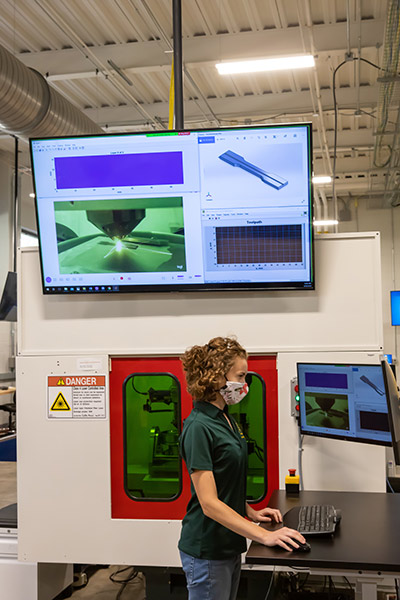General Information
Missouri S&T’s Master of Engineering degree in manufacturing is a practice-oriented, non-thesis program that is built around our signature research area of Advanced Manufacturing. The state-of-the-art curriculum is based on research on additive, advanced materials, robotics applications in areas extending from extreme environments to aerospace applications. The Master of Engineering degree in manufacturing is a practice-oriented, non-thesis program offered in the traditional format as well as via the web, so that students can access the lectures anywhere at any time. Due to its interdisciplinary nature, a wide range of courses in manufacturing are available. These include lean manufacturing, CAD/CAM, rapid prototyping, manufacturing management, and manufacturing automation, etc.
Please note that Master of Engineering in Manufacturing requires a student to take one course from each of the four core areas, as recommended by the Society of Manufacturing Engineering (SME). It is also purposefully flexible so a student can tailor the coursework within each area to a student’s needs. Typically, two to four courses within each focus area are offered each year that our advisors highly recommend for students who are interested in one or more of these pathways. The remainder of the courses are to complete the degree. Other courses that round out the degree program must be chosen in consultation with and approved by the student’s advisor.
Admission Requirements
- BS degree in engineering, computer science, math, physics, or a similar discipline
- GPA: Minimum undergraduate GPA 3.0
- GRE: Verbal + Quantitative 302, Analytical Writing 3.5
- Transcripts: Official transcripts required
- English proficiency test score requirements: TOEFL 80, IELTS 6.5, PTE 58, Duolingo 115
- Other requirements: Resume/CV, Statement of Purpose
Program Requirements
- Complete at least 30 total credit hours of lecture courses
- Complete 12 credit hours from the Manufacturing Core Curriculum (3 credit-hour core course from each area)
- Complete at least 6 credit hours of 6xxx lecture courses
- Complete a 3-hour practice-oriented project course. A student can discuss with any faculty in the manufacturing area about the project topic, and register the course as MECH ENG 5000 (or ENG MGT 5000, etc., depending on the project advisor’s affiliation)
- Complete 3 credit hours of any suggested manufacturing courses, OR approved Mathematics/Computer Science by the advisor
Practice-oriented project course (3 credit hours)
- MECH ENG 5000 or ENG MGT 5000, etc. (choose project advisor’s section): Special Problems (3 credit hours, offered every Fall, Summer, and Spring)
List of Elective Courses (27 credit hours, must include at least one course from each area)
Area 1: Materials and Manufacturing Processes (only one 3XXX level class in this approved list is allowed for the degree program)
- MECH ENG 3001: Additive Manufacturing (3 credit hours, offered every Fall)
- MECH ENG 3001: Reverse Engineering to Remanufacturing (3 credit hours, offered every Spring)
- MECH ENG 3001: Sustainable Processes in Manufacturing (3 credit hours, offered every Spring)
- MECH ENG 3653: Manufacturing (3 credit hours, offered every Fall and Spring)
- MECH ENG 5001: Smart and Multifunctional Materials (3 credit hours, offered every Spring)
- MECH ENG 5212: Introduction to Finite Element Analysis (3 credit hours, offered every Spring)
- MECH ENG 5236: Fracture Mechanics (3 credit hours, offered every Spring)
- MECH ENG 5282: Introduction to Composite Materials & Structures (3 credit hours, offered every Spring)
Area 2: Process, Assembly, and Product Engineering
- ENG MGT 5515/MECH ENG 5757: Integrated Product and Process Design (3 credit hours, offered every Fall)
- MECH ENG 5708: Rapid Product Design and Optimization (3 credit hours, offered every Spring)
- MECH ENG 5763: Principles and Practice of Computer Aided Design (Lab 1 credit hour, lecture 2 credit hours, offered every Fall)
- MECH ENG 6663: Advanced Digital Design and Manufacturing (3 credit hours, offered every Spring)
Area 3: Manufacturing Competitiveness
- ENG MGT 5710: Introduction to the Six Sigma Way (3 credit hours, offered every Fall)
- ENG MGT 5613: Value Analysis (3 credit hours, offered every other Spring)
- ENG MGT 6611: Lean Systems (3 credit hours, offered every Spring)
- ERP 5110: System Design and Implementation (3 credit hours, offered every Fall)
Area 4: Manufacturing Systems Design
- MECH ENG 5449: Robotic Manipulators and Mechanisms (Lab 1 credit hour, lecture 2 credit hours, offered every Spring)
- MECH ENG 5478: Mechatronics (Lab 1 credit hour, lecture 2 credit hours, offered every Spring)
- MECH ENG 5653: Computer Numerical Control of Manufacturing Processes (3 credit hours, offered every Fall and Spring)
- MECH ENG 5656: Design for Manufacture (3 credit hours, offered every Spring)
- MECH ENG 6659: Advanced Topics in Design and Manufacturing (3 credit hours, offered every Spring)
Any other course(s) approved by the student’s academic advisor.
Visit course availability to see the full list and timing.
Please note: During the semester, a student will have completed nine hours of graduate credit, the student must formally plan the remainder of their graduate program in consultation with their academic advisor, and submit a Form 1 for approval, first to the department chair and then to the vice provost of graduate education.



Follow Mechanical and Aerospace Engineering